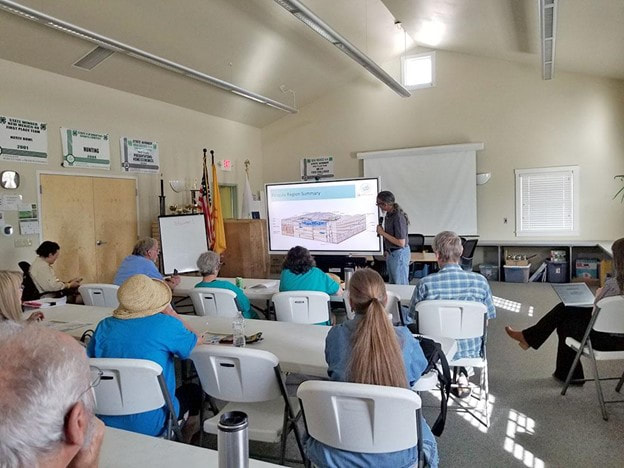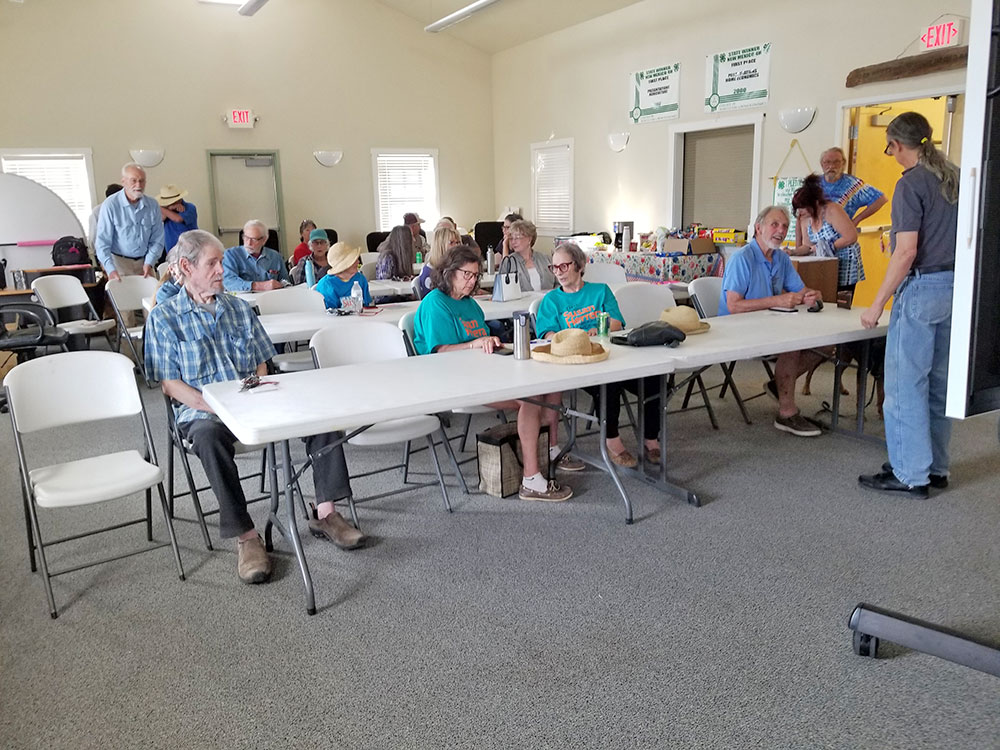|
By Jessica Rath Images courtesy of Jessica Rath The New Mexico Bureau of Geology & Mineral Resources, Aquifer Mapping Program, has been conducting a study of the aquifers in Rio Arriba County. On Tuesday, June 4, the initial results of the study relating to Abiquiu, Mendanales, and El Rito were presented at a public meeting at the Rio Arriba Rural Events Center. The presenters were Aquifer Mapping Program Manager Laila Sturgis and hydrogeologist Dr. Talon Newton. Project Consultant Jessica Johnston introduced the speakers. The study was funded by Representative Susan Herrera, and executed by the Research and Service Division of New Mexico Tech in Socorro. About 50 people came together to hear about the results of the study. This study is important, Ms. Johnston explained, because probably everybody in this area depends on groundwater for all aspects of life: for drinking, bathing, cleaning, potentially watering your livestock, etc., but we don't know how much water we have. We don't know what the aquifers look like. We don't know if they're getting recharged. And most importantly, we don't know if the water quality is good for drinking or for other uses. We want to look into the future and make sure our grandchildren and great great grandchildren have water available. But we don’t know how. Hopefully this will be the first part of an ongoing series of studies. Laila Sturgis is the aquifer mapping program manager at the Bureau of Geology. She explained that they measure groundwater across the state and that it’s free for homeowners through this program. Their goal is to serve rural areas that are not getting water monitoring support. The project was divided into three chapters, the Chama study area, the Abiquiu study area, and the Dixon study area. Most of the communities in Rio Arriba County rely on groundwater for domestic and municipal supply. Deep wells can be unpredictable, both in quantity (how much the well is able to pump) and in quality: often deeper wells have poor water quality. Shallow wells can be prone to drying during drought, or they can be contaminated from septic tanks and other things like that. So, shallow wells can be more reliable, but are more susceptible to contamination. Surface water is the primary water for agriculture. Rivers and streams in the region are highly connected to the shallow groundwater; it’s almost like one system. The goal of these studies is to find reliable water for more community long term development.
A sediment aquifer is water that's stored in the spaces between grains. These are loose river deposits, shallow deposits that are not consolidated into hard rocks. It's highly permeable, which means that water can easily move through the material. On the other side are fractured rock aquifers which are much less reliable. Those are the two most common wells in the state. One of the main ways groundwater is recharged in our state is through snow. When it starts melting, it can seep into the ground at a nice rate, and actually make it deeper into the ground. Rain events are usually flashier because water comes and goes really fast. So snow is really good for recharging our aquifers. The study measured 43 wells in the Abiquiú Valley for water depth, and sampled 42 wells for water chemistry. They tested for surface contaminants such as E Coli and for heavy metals, like uranium, and arsenic. Iron, which is frequently present, is a secondary maximum contaminant level. So it doesn't really have any health issues associated with it, but it could change the way the water tastes. It’s the same with manganese. Because of the possibility of pathogens like E Coli it is recommended to get one’s water tested. The results of the study will be published shortly, once the report is done. Please visit the New Mexico Bureau of Geology & Mineral Resources website, https://geoinfo.nmt.edu/, if you want to find out about the final conclusions of the study. The Bureau, which is located in Socorro, also hosts a Mineral Museum which has over 18,000 mineral specimens and is over 100 years old.
2 Comments
Philip Factor
6/14/2024 07:59:59 am
Thanks OI would appreciate a copy of the report. We have a well and use it for all house hold needs.
Reply
Jessica
6/15/2024 07:44:18 am
Hello Philip, at the time of the meeting the results of the study were not yet available. Please check the website: https://geoinfo.nmt.edu/
Reply
Leave a Reply. |
Abiquiu NewsLocal News Stories Archives
July 2024
Categories |


 RSS Feed
RSS Feed